Introduction
Post-Market Clinical Follow-Up (PMCF) represents a critical component in the lifecycle of medical devices, ensuring their ongoing safety and efficacy beyond initial market authorization. As healthcare systems increasingly prioritize patient safety and regulatory compliance, the significance of PMCF cannot be overstated. In regions like Peru, where healthcare infrastructure may face challenges, the implementation of PMCF becomes even more essential.
This article delves into the intricacies of PMCF, exploring its:
- Regulatory framework
- Methodologies
- Various challenges faced in conducting effective studies
With insights from industry experts and case studies highlighting successful practices, it aims to equip stakeholders with the knowledge necessary to navigate the evolving landscape of medical device regulation and enhance patient outcomes.
Introduction to Post-Market Clinical Follow-Up (PMCF) in Medical Devices
Post-Market Clinical Follow-Up functions as a structured framework for the ongoing observation and assessment of medical instruments after market approval. This process is crucial for verifying the safety and performance of products in real-world environments, ensuring that any long-term effects or potential complications are promptly identified. In regions such as Peru, Post-Market Clinical Follow-Up Peru is an integral part of risk management strategies designed to safeguard patient health and maintain public health standards.
With more than 20 years of experience in Medtech, bioaccess® provides expedited clinical research services for health products in Latin America, focusing on:
- Early-Feasibility Assessments (EFS)
- First-In-Human Trials (FIH)
- Pilot Trials
- Pivotal Trials
- Post-Market Clinical Follow-Up Trials
Our service capabilities include:
- Feasibility studies
- Site selection
- Compliance reviews
- Trial setup
- Import permits
- Project management
- Reporting
Recent updates to PMS requirements established by the Medical Device Regulation (MDR) and In Vitro Diagnostic Regulation (IVDR) signify a shift towards more rigorous and proactive data collection and analysis, reinforcing the necessity of post-market clinical follow-up in medical device safety.
For instance, statistics indicate that effective post-market clinical follow-up practices have led to a 30% reduction in adverse events reported in the first year after authorization. Stakeholders—including developers, regulatory bodies, and healthcare professionals—must acknowledge that a comprehensive understanding of post-market clinical follow-up is essential for ongoing safety evaluations and compliance with evolving regulatory demands. Katherine Ruiz, a Regulatory Affairs specialist, has guided numerous foreign producers on securing market authorization for their innovations in Colombia, emphasizing the essential role experts have in promoting Post-Market Clinical Follow-Up Peru practices.
Furthermore, bioaccess® ensures adherence to the latest regulatory requirements through comprehensive compliance reviews and monitoring processes. The case study titled 'Conclusion on PMS Requirements' illustrates how these stringent requirements aim to ensure that medical devices and IVDs remain safe and effective throughout their lifecycle, providing a real-world example of the effect of Post-Market Clinical Follow-Up Peru on patient safety.
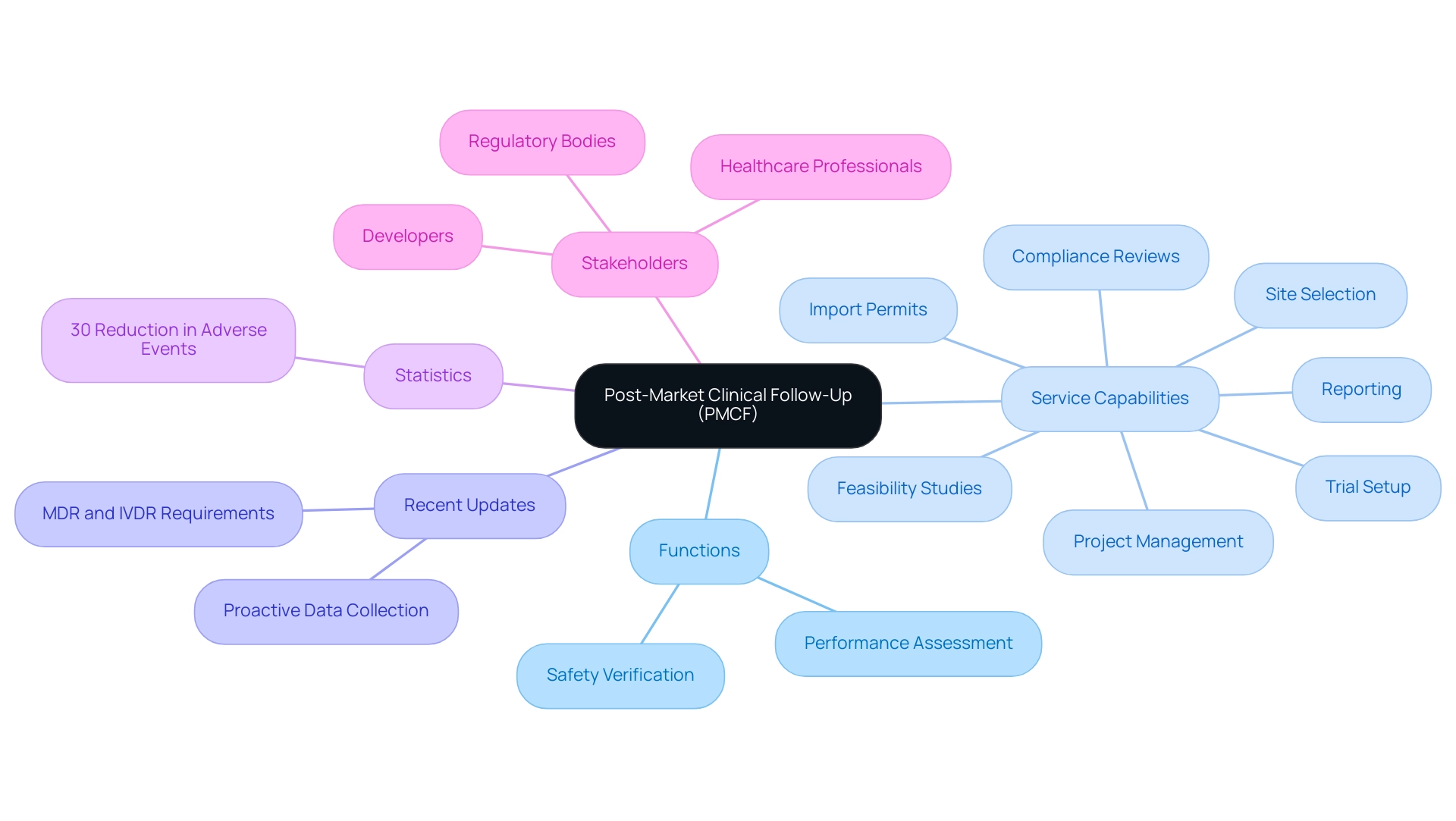
Regulatory Framework for PMCF in Peru: Key Guidelines and Standards
In Peru, the regulatory framework for Post-Market Clinical Follow-Up Peru is primarily influenced by national regulations issued by the Ministry of Health (MINSA). These regulations are strategically aligned with international standards, particularly those set forth by the International Organization for Standardization (ISO) and the International Medical Device Regulators Forum (IMDRF). Essential guidelines within this framework highlight the importance of executing a thorough risk management plan that includes Post-Market Clinical Follow-Up Peru activities, along with strict reporting requirements for adverse events and established protocols for the assessment of post-market data.
As noted by Apotech, 'Yes, our team can also act as your authorized representative if you work in the cosmetics industry,' highlighting the importance of knowledgeable representatives in navigating these regulations. Following these regulations is essential, as it not only protects the safety and effectiveness of healthcare products but also fosters trust among professionals and patients. For instance, Apotech’s role as an authorized representative for cosmetic products, registered with both the European Commission and MHRA, exemplifies effective adherence to guidelines and underscores the importance of having such expertise when managing health-related products.
To uphold compliance and guarantee the effectiveness of Post-Market Clinical Follow-Up Peru practices, stakeholders are encouraged to stay alert to updates to these guidelines, which are crucial for promoting a sustainable and trustworthy healthcare product market. bioaccess® offers comprehensive clinical trial management services throughout Latin America, with expertise in Early-Feasibility, First-In-Human, Pilot, Pivotal, and Post-Market Clinical Follow-Up Peru studies, ensuring that all regulatory requirements, including risk management and adverse event reporting, are efficiently met. Additionally, the EUDAMED SRN NUMBER: FR-AR-000039455 serves as a concrete reference point for regulatory compliance, reinforcing the importance of adhering to established standards.
Katherine Ruiz, a specialist in regulatory matters for healthcare instruments and in vitro diagnostics in Colombia, provides invaluable insight into navigating these intricate regulations, further improving the effectiveness of Post-Market Clinical Follow-Up Peru practices.
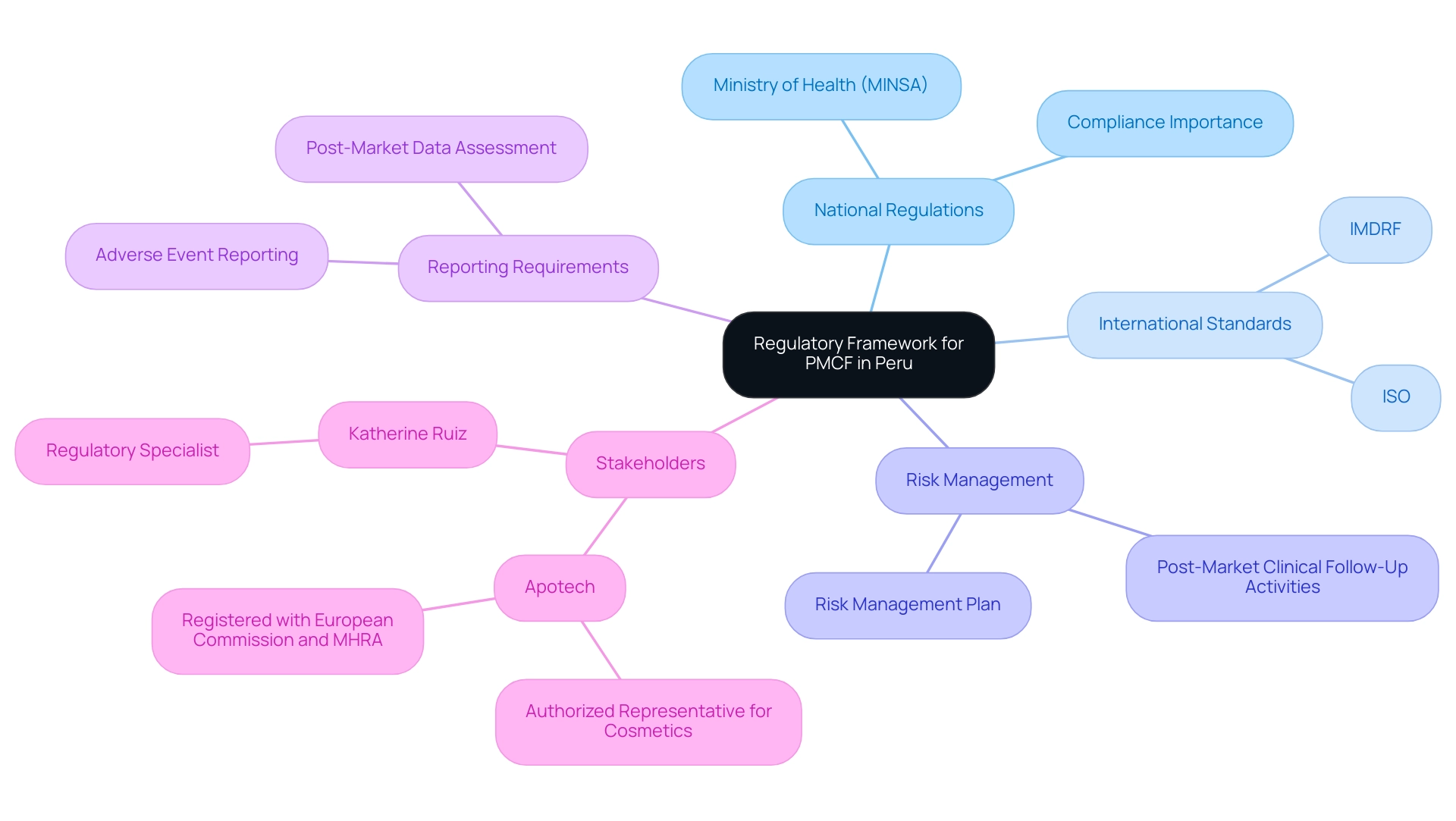
Methodologies for Conducting Effective PMCF Studies
Post-Market Clinical Follow-Up Peru research utilizes a range of methodologies to guarantee thorough safety and efficacy assessments of medical instruments. Among these, observational research is especially valuable as it allows researchers to collect real-world data directly from patients using the tool in their daily environments, capturing insights that may not be evident in controlled settings. In contrast, cohort investigations enable the evaluation of outcomes over time, allowing for comparative analysis between various user groups, thus offering a deeper understanding of performance.
Furthermore, registry-based research serves an essential role by creating a strong database that monitors long-term safety and effectiveness, facilitating ongoing assessment of equipment performance and patient outcomes. Dr. Johannes Goldmann underscores the significance of choosing a methodology, stating, "If a Post-Market Clinical Follow-Up Peru is essential, it is crucial to differentiate between the various types and to recognize and meet the corresponding regulatory requirements." Therefore, selecting the appropriate methodology is essential, aligning it with the specific type of medical device and the goals of the evaluation.
This approach ensures that the data gathered is not only relevant but also reliable, ultimately informing ongoing safety assessments and regulatory compliance. As part of the clinical trial management services provided by bioaccess®, which boasts over 20 years of experience in Medtech, it is mandated that the sponsor must notify relevant authorities, such as INVIMA, at least 30 days before starting the clinical investigation, which is essential for regulatory adherence. Furthermore, planning and calculating the number of cases is vital, as inadequate planning can compromise the validity of results, a requirement emphasized in the MDR and ISO standards.
The case analysis titled 'Summary and Conclusion on Post-Market Clinical Follow-Up Peru Research' illustrates how identifying when such research is necessary and understanding regulatory requirements can be achieved with targeted support, reflecting bioaccess®'s expertise in managing Early-Feasibility, First-In-Human, Pilot, Pivotal, and Post-Market Clinical Follow-Up Research across Latin America, including detailed services such as feasibility assessments, site selection, compliance reviews, trial setup, import permits, project management, and reporting.
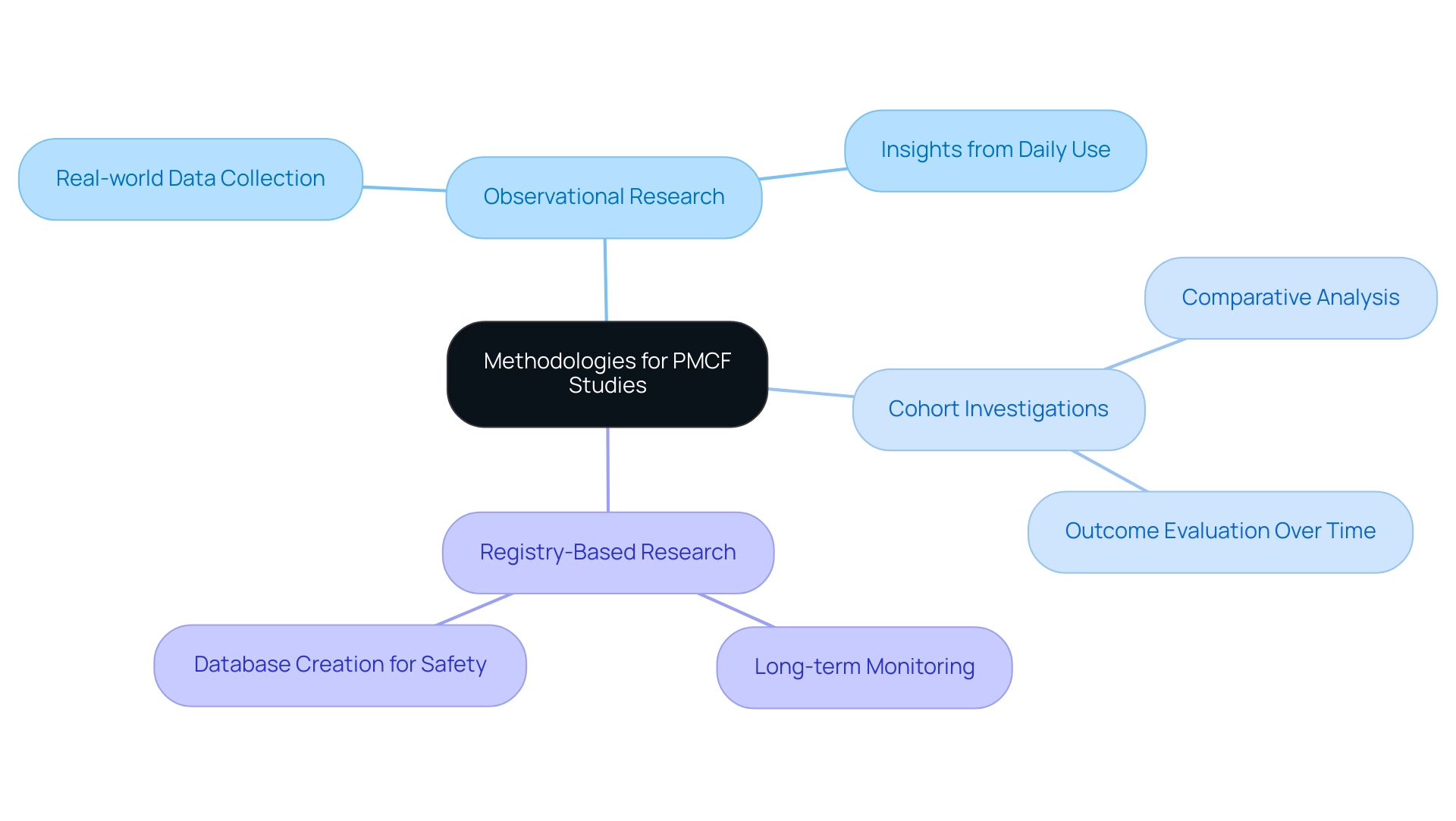
Challenges and Considerations for PMCF in Peru
Conducting Post-Market Clinical Follow-Up Peru investigations presents several significant challenges. Limited access to patient populations dramatically impacts the feasibility of these research efforts, particularly in rural areas where healthcare infrastructure is underdeveloped. Recent reports suggest that public health program maintenance, like the National Peruvian TB program, represented only 1% of its 2006 budget, underscoring the limitations on resources accessible for clinical research.
Furthermore, cultural differences can create additional barriers to patient engagement, complicating recruitment efforts. Logistical issues, particularly in data collection and management, exacerbate these challenges, often leading to delays and inaccuracies in research results. Regulatory hurdles can impede progress, especially with potential changes in guidelines or ambiguities in compliance requirements.
As noted by Joaquin A. Blaya, 'Information is essential to build a response [to drug-resistant diseases], and only computerized information systems allow sufficiently rapid exchange of information within and between countries.' This underscores the critical role that effective information systems play in navigating these challenges. To tackle these challenges, utilizing the expertise of bioaccess® in handling extensive clinical trial services—including feasibility assessments, compliance evaluations, trial setup, import permits, project management, and reporting—can offer valuable insights into improving quality in healthcare through collaborative research efforts.
Furthermore, carrying out Post-Market Clinical Follow-Up Peru research can provide substantial economic advantages, such as job creation and enhanced healthcare infrastructure, which are essential for local economies. Additionally, training sessions for laboratory and health center personnel are essential for building capacity and overcoming logistical issues. The recent incorporation of e-Chasqui into the open-source medical record system OpenMRS further illustrates advancements in information management that can aid Post-Market Clinical Follow-Up Peru.
By fostering strong connections with local healthcare providers, investing in patient outreach initiatives, and maintaining adaptability in research protocols to ensure responsiveness to local contexts and cultural nuances, stakeholders can effectively address potential barriers to conducting Post-Market Clinical Follow-Up Peru, leading to more successful outcomes.
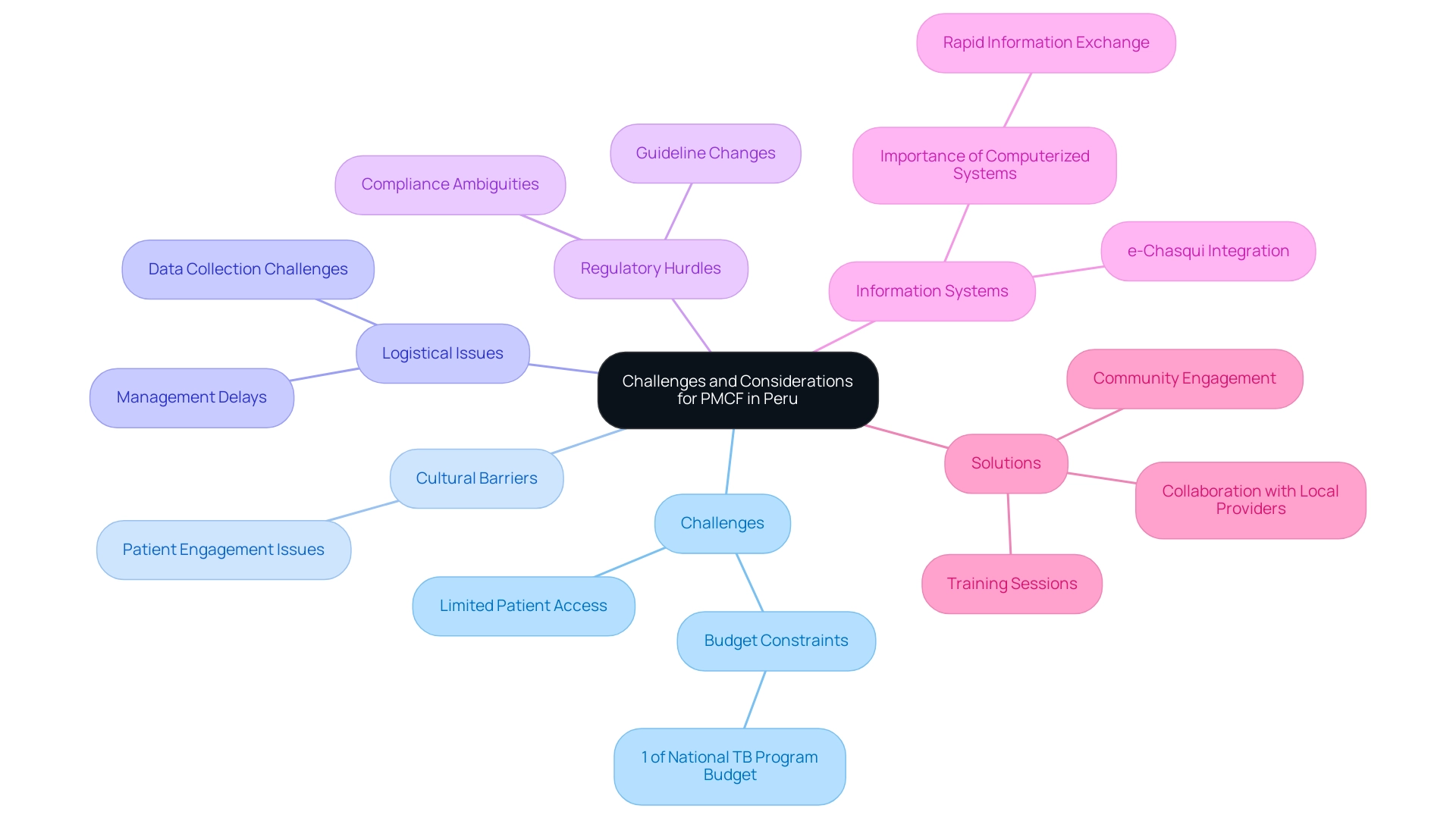
Data Collection and Analysis in PMCF: Ensuring Compliance and Safety
In Post-Market Clinical Follow-Up Peru research, the integrity of data collection and analysis is paramount, necessitating strict adherence to regulatory requirements and ethical standards. At bioaccess®, we emphasize comprehensive clinical trial management services, which include:
- Feasibility assessments
- Meticulous site selection
- Compliance reviews
- Trial setup
- Import permits
- Project management
- Thorough reporting
Essential steps begin with the careful design of data collection instruments that not only capture pertinent information but also safeguard patient confidentiality and enhance data security.
The implementation of electronic data capture (EDC) systems can significantly streamline these processes, as highlighted by Khaled El Emam, who notes,
The adoption of EDC systems in clinical trials in Canada is higher than the literature indicated; a large proportion of clinical trials in Canada use some form of automated data capture system.
Such systems not only enhance data precision but also enable the thorough statistical analysis necessary to identify trends, assess risks, and evaluate the overall safety and performance of healthcare devices. Notably, the odds ratio for a change from pediatric to adult is 3.7 for a two-tailed alpha level of 0.05, underscoring the importance of statistical analysis in understanding patient demographics.
Furthermore, Gans et al.'s research on the adoption of electronic health records by healthcare organizations in 2005 provides historical context that reinforces the relevance of EDC systems today. Regular audits of data handling practices are crucial to ensure compliance with Post-Market Clinical Follow-Up Peru protocols, which address potential biases that may arise from unregistered trials, as noted in the case analysis titled 'Limitations of EDC Adoption Research.'
These measures are vital for mitigating risks associated with data management. Furthermore, INVIMA, as Colombia's National Food and Drug Surveillance Institute, plays a vital role in supervising the regulatory framework that governs these studies, further improving the credibility and safety of health products in the market. By prioritizing effective data collection and analysis techniques, stakeholders can enhance the safety of medical devices and contribute significantly to the growing body of evidence that supports their use.
Our team at bioaccess®, with over 20 years of experience in Medtech, is dedicated to providing the specialized knowledge and flexibility required to navigate the complexities of clinical trials successfully.
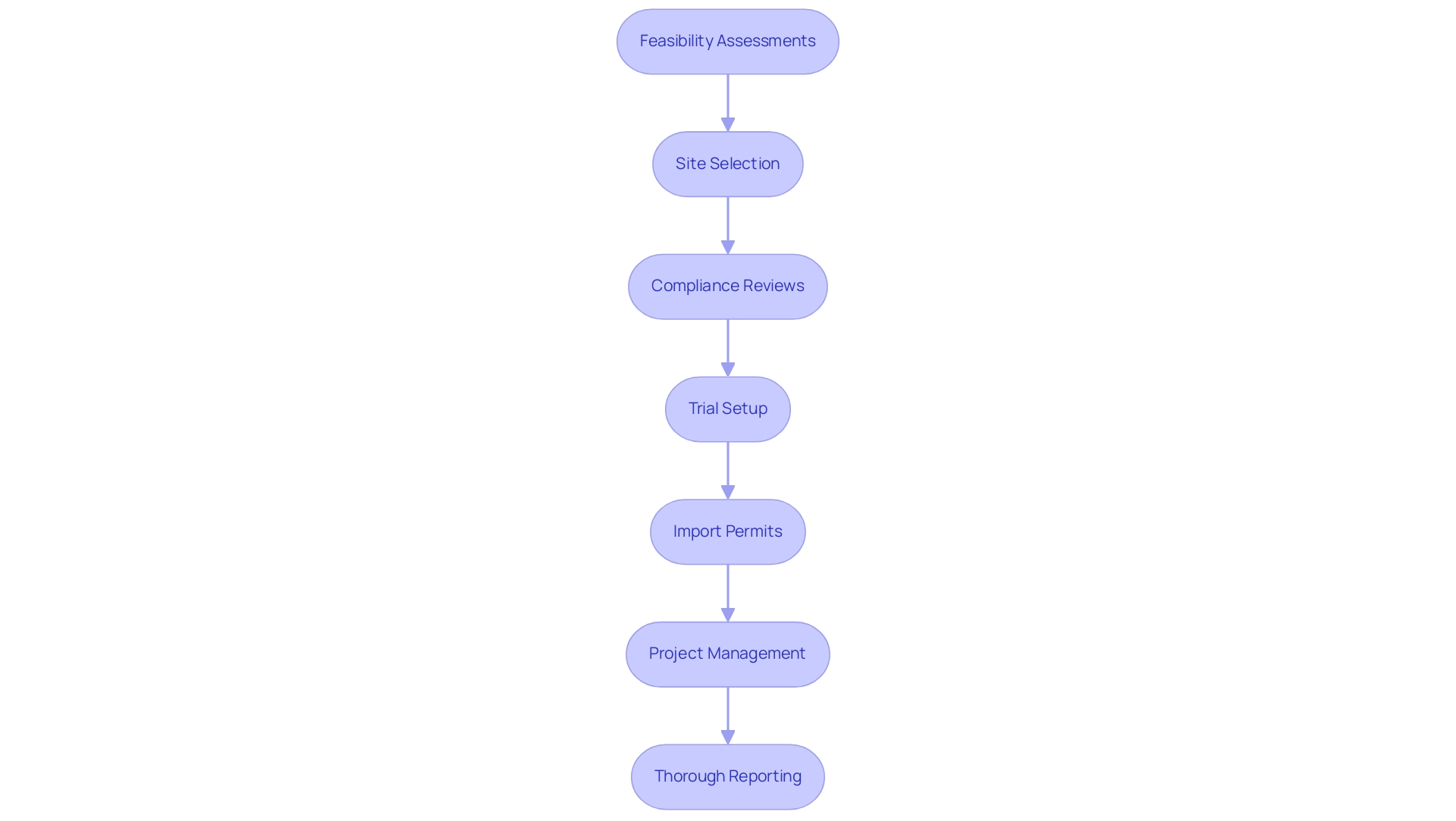
Conclusion
Post-Market Clinical Follow-Up (PMCF) is an indispensable element in the lifecycle of medical devices, serving to ensure their ongoing safety and efficacy in real-world settings. The regulatory framework in Peru, aligned with international standards, mandates comprehensive risk management plans and strict reporting protocols to safeguard patient health. As demonstrated, successful implementation of PMCF can lead to significant improvements in patient safety, evidenced by a notable reduction in adverse events.
The methodologies employed in PMCF studies, including observational and cohort studies, play a pivotal role in gathering vital data that informs continuous safety assessments. However, stakeholders face various challenges, particularly in regions with limited healthcare infrastructure like Peru. Addressing these obstacles through effective resource management, cultural sensitivity, and advanced data collection techniques is crucial for enhancing the reliability of PMCF studies.
Ultimately, the commitment to rigorous PMCF practices not only fosters regulatory compliance but also strengthens trust among healthcare professionals and patients. By leveraging expert knowledge and innovative solutions, the medical device industry can navigate the complexities of PMCF, ensuring that devices remain safe and effective throughout their lifecycle. Emphasizing the importance of ongoing evaluation and adaptation will be key to advancing patient outcomes and upholding public health standards in the evolving landscape of medical device regulation.




